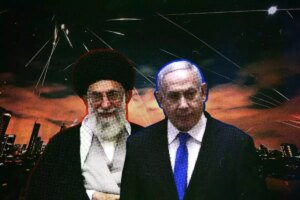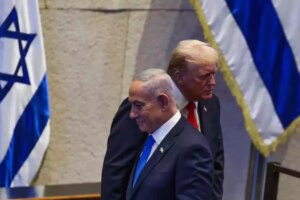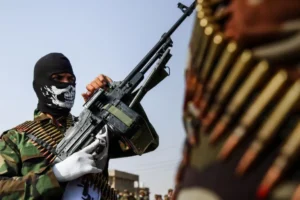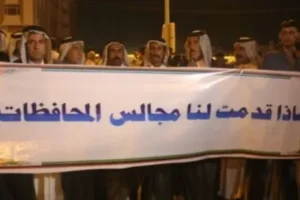
Shafaq News
Rising tensions and
expanding conflict zones across the Middle East have set a charged backdrop for
US Special Envoy to Iraq Mark Savaya’s inaugural statement, which has reignited
debate over Iraq’s sovereignty and the future of its national security.
Savaya, appointed by
US President Donald Trump on October 19, 2025, emphasized the need to unify
Iraq’s armed forces under the central government’s authority and prevent any
armed groups from operating outside the state’s control. His remarks, analysts
say, reflect Washington’s intent to recalibrate the internal balance in Iraq
amid fears that the Iranian-Israeli confrontation could spill over and
destabilize the country.
The Iraqi-born
American businessman of Chaldean-Assyrian descent said his mission focuses on
promoting “stability, sovereignty, and prosperity” in Iraq. He called for a
closer Baghdad-Erbil partnership and for “a fully sovereign Iraq, free from
malicious foreign interference — particularly from Iran and its proxies.”
Read more: Mark Savaya: Who is Trump’s third Special Envoy to Iraq?
A New Regional Map
Security expert
Mukhled al-Darib told Shafaq News that Washington’s latest move is part of a
broader regional transformation unfolding since October 7, 2023. “The Middle
East is witnessing the redrawing of a new map based on the emerging global
economic order, alternative energy corridors, and maritime routes competing
with China’s Belt and Road Initiative,” he said.
According to al-Darib,
Iraq is inevitably affected by these shifts. “Baghdad’s past alignment with the
so-called axis of resistance complicates the US project to consolidate its
influence in the region.”
He added that the
appointment of a special envoy to Iraq “is no coincidence,” pointing out that
“just as Washington sent envoys to Gaza, Lebanon, and Iran, it now seeks to
stabilize Iraq through a state-centered framework rather than allowing power to
remain fragmented among parallel forces.”
Al-Darib predicted
that Savaya will play a pivotal role ahead of Iraq’s next elections, attempting
to “dilute Iranian influence.” However, this approach could make government
formation “more complex, requiring new understandings between the state and the
armed factions.”
Unified Vision
The latest wave of US
sanctions on Iraqi entities and individuals signals a gradual escalation of
pressure that Washington is employing to advance its policies in Iraq.
The United States has
imposed sanctions on several Iraqi banks, companies, and businessmen linked to
Iran-backed armed groups, moves that pressure Baghdad economically and
politically.
By restricting access
to essential dollar transactions, the measures have increased uncertainty over
government budgets and the functioning of state institutions.
This has also deepened
tensions within Iraq’s fragile political scene, raising concerns about the
country’s ability to manage these mounting challenges.
Read more: Sovereignty strain: US sanctions trigger Iraq’s liquidity nightmare
From Jerusalem,
researcher Hussein al-Deek, an expert on Israeli and American affairs, told
Shafaq News there is a joint American-European-Israeli consensus “to prevent
the existence of any armed entities operating outside state authority in the
Middle East — whether resistance groups or militias.”
“These groups emerged
under Iranian influence in Iraq, Lebanon, Yemen, and Gaza,” al-Deek said. “But
Washington and its allies have now decided to contain them.”
He noted that Iraq’s
case differs from other arenas because there is no confrontation between Iraqi
factions and Israel. “This makes integrating such groups into the Iraqi army a
more practical option.” While US policy in Lebanon and Palestine relies on
disarmament through force or political pressure, al-Deek believes Washington
“is betting on Baghdad’s ability to regulate its relationship with the factions
so that they become part of the formal security system under sovereign Iraqi
decision-making.”
Considering Iraq,
Lebanon, and Palestine each have distinct sociopolitical dynamics, Al-Deek
argued, “No single model can be applied to all three,” pointing out that “the
current US focus is tailored to Iraq, where balancing state and non-state
actors remains achievable without confrontation.”
Between Theory and
Practice
Jordanian political
analyst Kamal al-Zaghoul told Shafaq News that the US position announced by
Savaya marks a reassessment of its post-2003 policy in Iraq. “Washington now
realizes that dismantling the Iraqi army was a strategic mistake,” he said.
“Engaging with a national state is far more sustainable than relying on
militias.”
Al-Zaghoul added that
Trump, since his first term, had expressed support for strengthening national
states and eventually reducing the US footprint in Iraq. “But he also
recognized that withdrawal is impossible without first integrating the armed
factions into state institutions.”
Still, al-Zaghoul cautioned
against “forced integration,” stressing that Middle Eastern states are built on
social contracts linking people and government. “Such a connection cannot be
imposed by coercion — it must be negotiated.”
“If there is no shared
belief in the concept of a national state, no American or foreign plan will
succeed,” he continued, emphasizing that “the success of this US strategy
depends on genuine intentions to promote stability and prosperity, not merely
to control resources.”
The analyst concluded
that if Washington’s motives are rooted in fairness and development, the
project to integrate Iraq’s armed factions into the state “could succeed.”
However, “if the policy remains a thinly veiled political maneuver, it risks
collapsing once Trump’s term ends.”
Written and edited by
Shafaq News staff.





